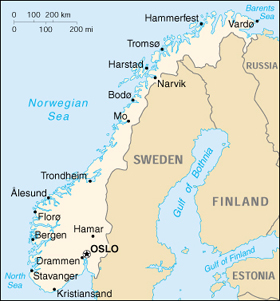Norway

About the Flag
Norway is located in northern Europe bordering the North Sea and North Atlantic Ocean west of Sweden. It is a constitutional monarchy with its capital at Oslo. The Chief of State is the King, and the Head of Government is the Prime Minister. There is a modified Unicameral parliament. The legal system lies somewhere between a civil law and common law traditions. Norway is a member of the European Economic Area (“EEA”), OECD, UN, and IMO. Norwegian is the official language.
Norway has a mixed economy combining free market activity and government intervention. It is ranked among the world's major shipping nations. The government controls the vital petroleum sector and subsidizes agriculture and areas with sparse resources. Norway is an exporter of petroleum, forest products, metals, fish and fish products. Major trading partners are the EC nations. The unit of currency is the Norwegian kroner.
The Kingdom of Norway is stable economically and politically. It has an objective, capable and efficient legal system. The courts have a high standing. There are a number of law firms which include shipping and finance in their areas of practice. The firms are of high international standing and are well connected with capable foreign law firms. The international shipping practice of these firms is to a large extent conducted in English.
The national ship register is called the Norwegian Ordinary Ship Register (“NOR”). The law governing the NOR is the Merchant Marine Act of 24th June 1994 No. 39. In addition to its traditional ship register (“NOR”), Norway also has a second, captive register, the Norwegian International Ship Register (“NIS”) which was created by an act of Parliament, the NIS Act of 12 June 1987 No. 48.
The NIS differs from the NOR in that it enables direct registration by foreign shipowners and allows employment of foreign seafarers on local/national wages established through collective wage agreements between an employers' federation and an independent union which organizes the seafarers. NIS has been designated as a second register by the ITF. NIS vessels beneficially controlled by non-Norwegian owners may be classified as Flag of Convenience (FOC) unless covered by an ITF approved collective agreement.
There is one nationwide registration office, the Ship Register (“Skipsregistrene”) located in Bergen under the governance of the Ministry of Trade and Industry which administers both the NOR and the NIS. The Norwegian Maritime Directorate is the enforcement agency for all matters relating to the seaworthiness of all Norwegian ships and to the safety and qualifications of seafarers.
On January 1, 2012, both the Norwegian Ordinary and International Ship Registers merged with the Norwegian Maritime Directorate to form the Norwegian Maritime Authority. As a result, both registers are now a department of the Directorate. Registration policies will remain the same but will become easier and more efficient as a result of consolidating the organizations. The Norwegian Maritime Authority and its components remain departments of the Ministry of Trade and Industry.
The Norwegian Ordinary and International Ship Registers are efficient and objective, maintaining a high professional standing in its work. They are recognized by owners and financiers as being reliable and offering strict but helpful service.

